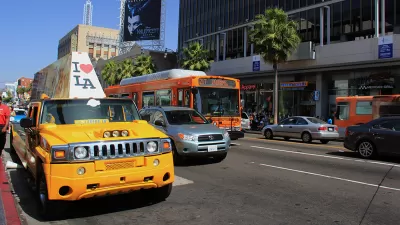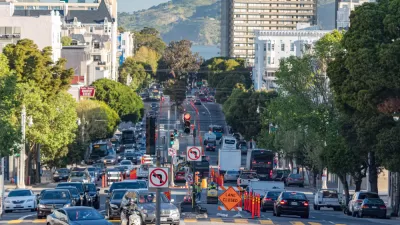At long last, California law will consider the amount of driving, rather than vehicle delay, when evaluating the environmental impacts of new developments. This is a more common-sense approximation of their environmental impacts.

"Starting Wednesday, at long last, vehicle delay will no longer be considered an impact to the environment under California environmental law. Instead, the amount of driving – rather than the smooth flow of driving – must be measured. This is a more common-sense approximation of the environmental damage from vehicle trips serving new development than mere delay to drivers, but the old way was so entrenched that it has taken years to get to this point," reports Melanie Curry.
"When S.B. 743 finally goes into effect, long commutes and suburban housing will not suddenly cease to exist. What will happen is that, under California environmental law, the amount of driving that new projects produce will have to be estimated, and if it is excessive, it will have to somehow be mitigated. Shenanigans to sidestep CEQA won’t stop, but the focus will shift from the current practice of mitigating congestion by building wider, faster roads – thus encouraging more driving and indeed ensuring it is the only viable way to get around – to finding ways to encourage more sustainable and healthy and less environmentally harmful travel – such as walking, biking, and, yes, transit."
"The new rules will make it easier to build housing near transit and jobs, where fewer car trips would be generated, because trying to mitigate for congestion – via wider roads and intersections – is much more difficult and expensive in built-up areas, and that burden will be removed. This can also make investments in sustainable and innovative transportation solutions, like ride sharing and micromobility, much easier for local and regional agencies. Those investments, in turn, can increase accessibility for residents who do not own cars."
FULL STORY: New Rule on Environmental Impacts of Driving, Long Awaited, Goes Into Effect on Wednesday

Maui's Vacation Rental Debate Turns Ugly
Verbal attacks, misinformation campaigns and fistfights plague a high-stakes debate to convert thousands of vacation rentals into long-term housing.

Planetizen Federal Action Tracker
A weekly monitor of how Trump’s orders and actions are impacting planners and planning in America.

San Francisco Suspends Traffic Calming Amidst Record Deaths
Citing “a challenging fiscal landscape,” the city will cease the program on the heels of 42 traffic deaths, including 24 pedestrians.

Adaptive Reuse Will Create Housing in a Suburban Texas Strip Mall
A developer is reimagining a strip mall property as a mixed-use complex with housing and retail.

Study: Anti-Homelessness Laws Don’t Work
Research shows that punitive measures that criminalized unhoused people don’t help reduce homelessness.

In U.S., Urban Gondolas Face Uphill Battle
Cities in Latin America and Europe have embraced aerial transitways — AKA gondolas — as sustainable, convenient urban transport, especially in tricky geographies. American cities have yet to catch up.
Urban Design for Planners 1: Software Tools
This six-course series explores essential urban design concepts using open source software and equips planners with the tools they need to participate fully in the urban design process.
Planning for Universal Design
Learn the tools for implementing Universal Design in planning regulations.
Heyer Gruel & Associates PA
JM Goldson LLC
Custer County Colorado
City of Camden Redevelopment Agency
City of Astoria
Transportation Research & Education Center (TREC) at Portland State University
Jefferson Parish Government
Camden Redevelopment Agency
City of Claremont





























